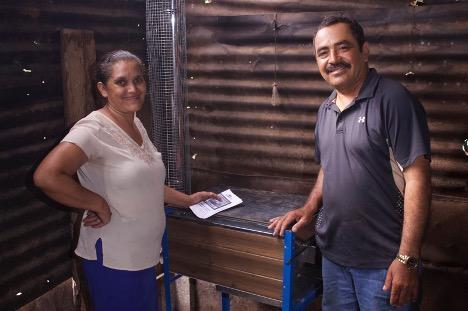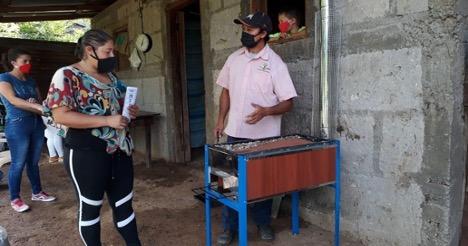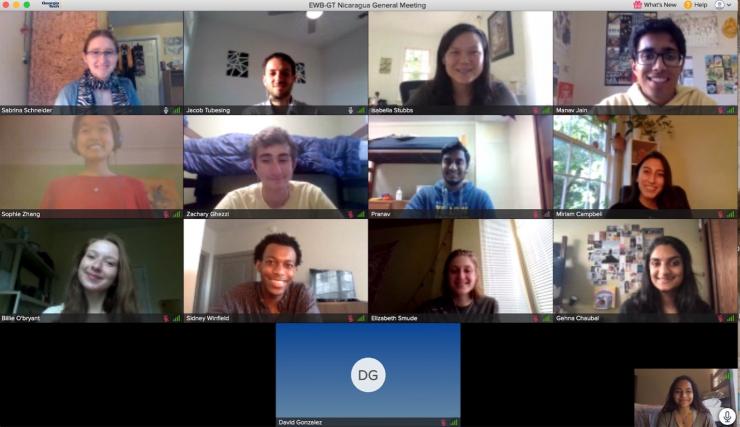Engineers Without Borders Project Installs 100 Clean Cookstoves in Nicaragua
Apr 05, 2021 — Atlanta, GA

Residents of Nuevo Amanecer in Nicaragua stand with their new clean cookstove, installed in 2019. Credit: Engineers Without Borders
In 2013, Georgia Tech student Heidi Vreeland visited the community of Nuevo Amanecer, a small neighborhood in rural Nicaragua. While there, Vreeland was struck by how damaging the method of cooking with an open fire could be to people’s respiratory health, exposing them to high levels of smoke, particulate matter, and carbon monoxide. This led to the beginning of a project to give the people of Nuevo Amanecer clean cookstoves, a project that’s been the work of Georgia Tech’s Engineers Without Borders (EWB) for almost eight years now.
The project, funded in part by the Georgia Tech Student Foundation and Parents Fund, has led to the installation of nearly 100 clean cookstoves in Nuevo Amanecer over the last two years. The stoves use a combustion chamber and chimney that filters and redirects smoke away from the users. This technology has also led to a marked improvement in the community’s air quality.
While the EWB team wanted to be able to visit Nuevo Amanecer in person to help install the stoves, they had to work remotely and find partners that could get the equipment there. In 2019, political instability kept them from being able to travel safely. Instead, they worked with Rayo de Sol, a local NGO; Poleña, a stove manufacturer; and EWB field engineers in Nicaragua to make sure that their project came to fruition. This partnership also helped them throughout 2020, when the Covid-19 pandemic prevented students from visiting the community for a second summer.
Proleña and Rayo de Sol effectively managed the stove installation and surveyed community members to determine their satisfaction and use habits. The EWB field engineers conducted air quality tests in the community to ensure that the new stoves were producing lower smoke emissions than traditional open fires. Back in Atlanta, EWB members at Tech analyzed the air quality data.
Working remotely also caused the EWB team to emphasize community relations. They made YouTube videos about the project, outlining best practices with the stove to share with the Nuevo Amanecer community. They also stayed in contact with members of the community via WhatsApp, checking in to see how the stoves were working and learn about life in Nicaragua.
While EWB’s goal of installing 100 cookstoves has almost been met and their time with the project draws to a close, members of the team still plan on maintaining the connections they made with the people of Nuevo Amanecer. Pending Covid-19 restrictions, a team plans on flying there in August to help monitor and evaluate the status of the stoves.
“It is not only rewarding to be able to apply skills I hope to use in my future career towards something I care so much about, but also being able to see and hear how your efforts are making a positive impact in the community,” said Sophie Zhang, a member of the project’s finance team. “Working on this project has shown me that change is made through passion and drive, and it has been wonderful working with people on campus who share that enthusiasm.”
Learn more about EWB’s Nicaragua project on Instagram (@ewbgtnicaragua) and Facebook.

Residents of Nuevo Amanecer in Nicaragua learn about their new clean cookstoves in the summer of 2020. Credit: Engineers Without Borders

Engineers Without Borders moved with meets to a virtual format starting in 2020. Credit: Engineers Without Borders
Institute Communications




